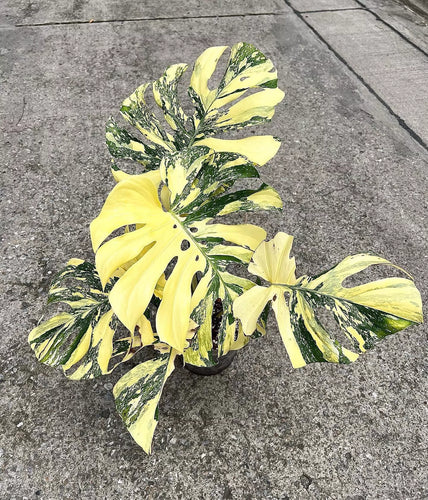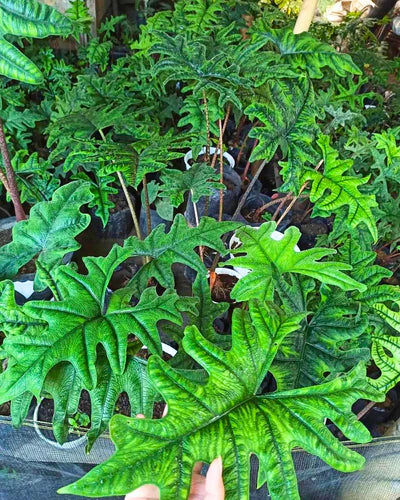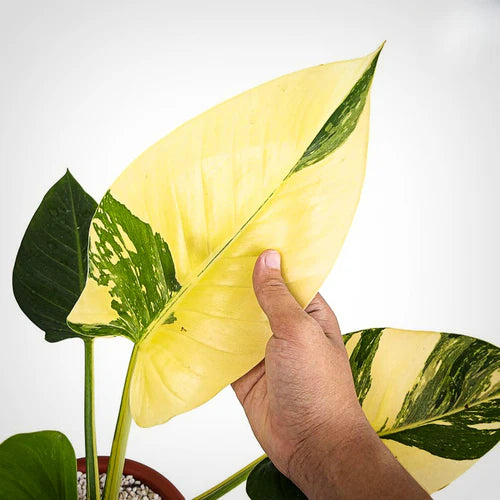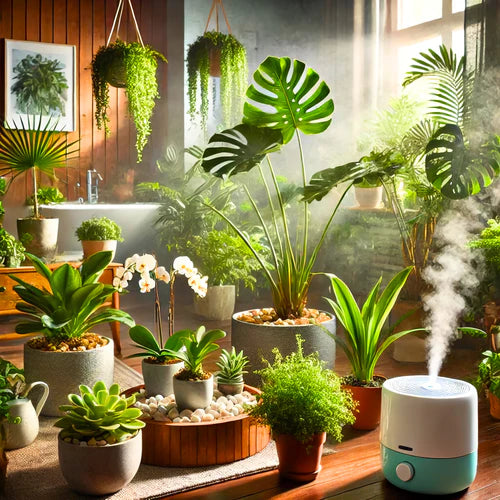White Princess Philodendron Care
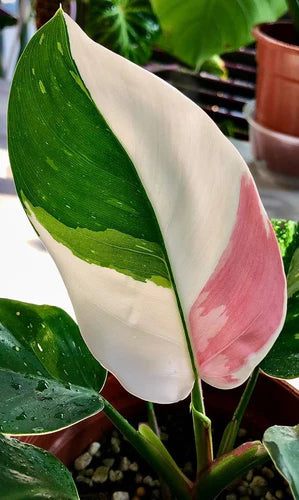
White Princess Philodendron Care: A Comprehensive Guide
Table of Contents
- Introduction to White Princess Philodendron
- Botanical Information
- Light Requirements
- Watering Needs
- Soil Preferences
- Temperature and Humidity
- Fertilization
- Pruning and Maintenance
- Propagation Techniques
- Common Problems and Solutions
- Toxicity
- Purchasing Tips
- Expert Tips for Thriving Plants
- Conclusion
Introduction to White Princess Philodendron
You came here to learn all about White Princess Philodendron care, and we’re going to spill the beans on everything you need to know. This breathtaking houseplant is renowned for its mesmerizing variegated leaves, featuring striking splashes of white, green, and amazing pops of pink once you get the care right. This tropical gem is ideal for both novice and seasoned plant enthusiasts.
In this comprehensive care guide, we'll delve into all the essential aspects of nurturing your Philodendron White Princess. From light and water requirements to soil preferences and propagation techniques, we’ve got you covered! Follow these expert tips to ensure your White Princess Philodendron thrives, adding a unique and enchanting charm to your indoor garden.
Botanical Information
- Botanical Name: Philodendron Erubescens 'White Princess'
- Common Names: White Princess Plant, White Princess Houseplant, Philodendron White Princess
- Family: Araceae
- Type: Evergreen perennial
- Size: Can grow to 2-3 feet indoors and even more depending on lighting conditions
- Native Area: Tropical rainforests of South America
- Toxicity: Toxic to pets and humans if ingested
Light Requirements
White Princess Philodendrons thrive in bright, indirect light. Direct sunlight can scorch the leaves, causing the beautiful variegation to fade. Place your plant near an east or north-facing window to provide optimal lighting conditions. If your home lacks sufficient natural light, consider using a grow light to supplement.
With proper care, including bright light and the right nutrients, a mature White Princess Philodendron can also produce stunning pink variegation
Watering Needs
Maintaining the right moisture level is crucial for the health of your White Princess Philodendron. Here are some tips for proper watering:
- Frequency: Water when the top 1-2 inches of soil are dry and leaves are looking a little curled.
- Method: Water thoroughly, allowing excess water to drain out of the pot. Avoid letting the plant sit in water to prevent root rot by tilting the pot after watering.
- Seasonal Adjustments: Reduce watering frequency in the winter months when the plant's growth slows down.
Soil Preferences
A well-draining, aerated soil mix is essential for your White Princess Philodendron. Use a high-quality potting mix designed for aroids or create your own blend using the following components:
- Ingredients: Equal parts peat moss, perlite, and orchid bark.
- pH Level: Slightly acidic to neutral (pH 5.5-7.0).
Temperature and Humidity
White Princess Philodendrons prefer warm, humid conditions similar to their native tropical environment.
- Temperature: Maintain temperatures between 65-80°F (18-27°C).
- Humidity: Aim for humidity levels of 60-80%. Use a humidifier or place a pebble tray with water near the plant to increase humidity if needed.
Fertilization
Fertilizing your White Princess Philodendron will promote healthy growth and vibrant foliage.
- Frequency: Fertilize every 4-6 weeks during the growing season (spring and summer).
- Type: Use a balanced, water-soluble fertilizer diluted to half strength.
- Winter Care: Reduce fertilization during the winter months when the plant's growth slows down.
Pruning and Maintenance
Regular pruning helps maintain the shape and health of your White Princess Philodendron.
- Pruning Time: Prune in the spring or early summer.
- Tools: Use clean, sharp scissors or pruning shears.
- Method: Remove any yellow, damaged, or overgrown leaves. Trim back leggy stems to encourage bushier growth.
Propagation Techniques
Propagating your White Princess Philodendron is a rewarding way to expand your plant collection or share with friends.
- Stem Cuttings: The most common method. Take a cutting with at least one node and a few leaves, and place it in water or soil to root.
- Air Layering: An advanced technique that involves wounding a section of the stem, wrapping it with moist sphagnum moss, and covering it with plastic wrap until roots form.
Common Problems and Solutions
Pests
- Spider Mites: Look for tiny webs and yellowing leaves. Treat with insecticidal soap or neem oil.
- Aphids: Small, green insects found on new growth. Remove with a strong water spray or insecticidal soap.
Diseases
- Root Rot: Caused by overwatering. Ensure proper drainage and reduce watering frequency.
- Leaf Spot: Fungal disease resulting in brown or black spots. Remove affected leaves and improve air circulation.
Care Mistakes
- Yellowing Leaves: Often a sign of overwatering or insufficient light. Adjust watering schedule and light conditions accordingly.
- Leggy Growth: Indicates inadequate light. Move the plant to a brighter location or supplement with a grow light.
Toxicity
The White Princess Philodendron contains calcium oxalate crystals, making it toxic to pets and humans if ingested. Keep the plant out of reach of children and pets, and wear gloves when handling if you have sensitive skin.
Purchasing Tips
When looking to buy a White Princess Philodendron, consider the following:
- Reputable Sellers: Purchase from trusted nurseries or online stores like Plant Vault to ensure you receive a healthy plant that has not had prior pest problems.
- Check for Variegation: Look for a plant with vibrant, consistent variegation. Avoid those with mostly green leaves.
- Inspect for Pests: Check the undersides of leaves and stems for any signs of pests before bringing the plant home.
Wholesale Options for Philodendron White Princess
For businesses looking to expand their inventory with the stunning Philodendron White Princess, Plant Vault Wholesale offers excellent wholesale options. Buying in bulk from Plant Vault Wholesale ensures that you get high-quality plants at competitive prices, ideal for resale. Our wholesale program provides a seamless way to purchase large quantities of the White Princess Philodendron or any of the 300+ tropical houseplants, making it a perfect choice for nurseries, garden centers, and online plant shops.
Plant Vault Wholesale focuses on delivering healthy, vibrant plants ready for resale. By purchasing in bulk, you can enjoy significant cost savings and a steady supply of these highly sought-after rare plants. Whether you're looking to stock up for a seasonal promotion or maintain a regular supply for your customers, Plant Vault Wholesale has you covered. Visit their website here to explore their wholesale options and place your order today.
Benefits of Buying in Bulk from Plant Vault Wholesale:
- Cost-Effective: Bulk purchases lower the cost per plant, maximizing your profit margins.
- Quality Assurance: All plants are carefully selected and maintained to ensure they arrive in perfect condition.
- Convenient Ordering: Easy online ordering process with flexible delivery options to meet your business needs.
- Exclusive Access: Gain access to a variety of rare and popular plant species, including the Marble White Princess Philodendron and other unique Philodendron varieties.
Incorporate the elegant White Princess Philodendron into your product lineup and attract plant enthusiasts with this captivating houseplant. Partner with Plant Vault Wholesale for reliable supply and exceptional quality.
Expert Tips for Thriving Plants
- Rotate Regularly: Turn your plant every few weeks to ensure even growth and light exposure - unless you want to grow it on a moss pole.
- Support Growth: Use a moss pole or stake to support vertical growth and help the plant climb.
- Leaf Cleaning: Bring the plant in the shower on watering day or wipe leaves with a damp cloth to remove dust and enhance photosynthesis.
Conclusion
The White Princess Philodendron is a captivating addition to any indoor garden. With its stunning variegation and relatively easy care requirements, it's no wonder this plant is so popular among houseplant enthusiasts. By following the care tips and guidelines outlined in this article, you'll be well on your way to growing a healthy and beautiful White Princess Philodendron.
Ready to add this beautiful plant to your collection? Visit Plant Vault to purchase your own White Princess Philodendron and bring a touch of tropical elegance to your home today! For more unique varieties, check out the Marble White Princess Philodendron and other selections at Plant Vault.
White Princess Philodendron FAQ
How much light does a White Princess need?
White Princess Philodendrons require bright, indirect light to thrive. Direct sunlight can scorch their leaves, leading to brown tips and faded variegation. The ideal lighting conditions can be achieved by placing the plant near an east or north-facing window where it can receive plenty of diffused sunlight throughout the day. If natural light is insufficient, especially during winter months, supplementing with a grow light can help maintain healthy growth and vibrant leaf colors.
How to increase variegation in White Princess?
Increasing the variegation in a White Princess Philodendron involves ensuring it receives optimal care, particularly in terms of light and nutrients. Here are some tips:
- Light: Ensure the plant gets bright, indirect light. Inadequate lighting can cause the variegation to diminish, resulting in more green leaves. Consider using a grow light if natural light is insufficient.
- Nutrients: Regularly feed the plant with a balanced, water-soluble fertilizer diluted to half strength during the growing season (spring and summer). This provides the necessary nutrients to support vibrant variegation.
- Pruning: Regularly prune to encourage new growth. Remove any predominantly green leaves to promote the growth of variegated ones.
Does Philodendron White Princess need a moss pole?
While a Philodendron White Princess does not necessarily need a moss pole, providing one can be beneficial for several reasons:
- Support: As a climbing plant, a moss pole offers support, helping the plant grow upright and preventing it from becoming leggy.
- Aesthetics: Using a moss pole can enhance the plant's natural beauty, making it a focal point in your indoor garden.
- Health: Climbing plants often develop larger, healthier leaves when given a structure to climb.
If you choose to use a moss pole, ensure it is kept moist to encourage root attachment and growth.
What is the best window for a White Princess Philodendron?
The best window for a White Princess Philodendron is an east or north-facing window. These windows provide bright, indirect light, which is ideal for the plant's growth. An east-facing window will give your plant gentle morning sunlight, while a north-facing window will offer consistent, diffused light throughout the day. If placing the plant near a south or west-facing window, ensure it is shielded from direct sunlight using sheer curtains or by positioning it slightly away from the window.
Do White Princess Philodendrons like to be root bound?
White Princess Philodendrons do not particularly like to be root bound. While they can tolerate being slightly root bound, prolonged root binding can hinder their growth and overall health. It is important to check the roots periodically and repot the plant when you notice:
- Roots growing out of the drainage holes.
- The plant's growth slowing down significantly.
- Soil drying out rapidly after watering.
When repotting, choose a pot that is 1-2 inches larger in diameter than the current one and refresh the soil to provide ample nutrients.
How to get pink leaves on White Princess?
Getting pink leaves on your White Princess Philodendron involves providing optimal care, particularly in terms of light and nutrition. Here’s how to encourage the development of pink leaves:
- Bright, Indirect Light: Ensure your plant receives plenty of bright, indirect light. This is crucial for promoting the variegation that includes pink hues. Insufficient light can lead to predominantly green leaves.
- Nutrient Supply: Regularly feed your plant with a balanced, water-soluble fertilizer diluted to half strength during the growing season. This provides the necessary nutrients to support vibrant and diverse leaf colors.
- Proper Pruning: Prune the plant to encourage new growth. Remove predominantly green leaves to stimulate the growth of more variegated ones, including those with pink coloration.
- Healthy Environment: Maintain optimal humidity (60-80%) and temperature (65-80°F or 18-27°C) conditions. A stable environment supports overall plant health, which is key to achieving vibrant foliage.
For more detailed care tips, you can also refer to this external guide.




